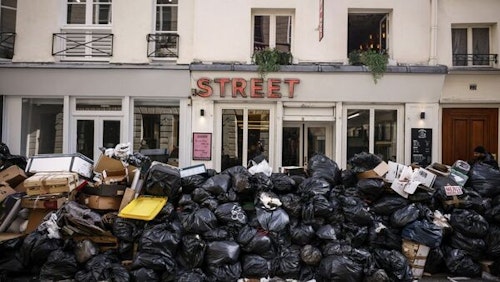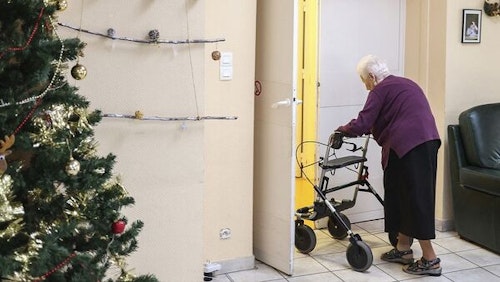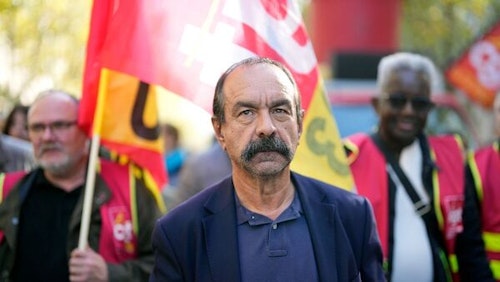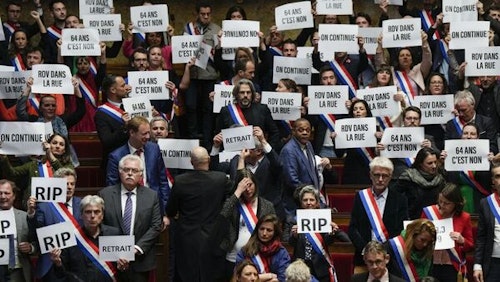French President Emmanuel Macron has been keeping a low profile for the last few days but has told allies he has no intention of dissolving parliament.
French President Emmanuel Macron will address the country on Wednesday in a much-anticipated television interview, aimed at appeasing the anger against his pension reform adopted by force and explaining how he intends to overcome this crisis without changing his government or turning to voters.
 ADVERTISEMENT
ADVERTISEMENT
 ADVERTISEMENT
ADVERTISEMENT

 ${title}
${title}
Live ended
That's it for the live!
Thank you for following this live with us. Please check euronews.com or download our application for more content.
Emmanuel Macron's interview main points
— The head of state said on Wednesday that his highly contested pension reform was “necessary” and should “come into force by the end of the year”, during a televised interview on TF1 and France 2.
— While new rallies were organized Tuesday evening against the reform in several major French cities, “we can accept neither the factious, nor the factions,” said Emmanuel Macron. “We will not tolerate any excesses,” he warned.
— The president also wished to “re-engage” dialogue with social partners on working conditions, to hear “the need for justice” expressed by the demonstrators. He promised that the discussion would concern in particular the evolution of careers or the hardship, and would be held “in the coming weeks”.
— Emmanuel Macron also said he was ready to “shoulder the unpopularity” to implement his reform. “I am not looking to be re-elected (...), but between short-term polls and the general interest of the country, I choose the general interest of the country,” he said.
He also regretted that unions had not presented a “compromise proposal” on the text, stressing that the government had done so, on the other hand, “with the Parliament”.
— During this interview, the head of state assured the Prime Minister, Elisabeth Borne, of his “confidence to lead [his] government team”.
Emmanuel Macron denounced the “cynicism” of certain “large companies” that have made large windfall profits allowing them to buy back their own shares on the stock market, and asked them for “an exceptional contribution” so that “workers can benefit” from this money.
Union leaders describe the interview as a joke, calling Macron a liar
French national newspapers 'Le Parisien' reported that two of the main French union leaders have said Emmanuel Macron was “in denial and lying” about the position of unions in this crisis.
Another union leader added that this interview was " a joke, given millions of people protesting in the streets”.
Emmanuel Macron sets three priorities: full employment, republican order and better living progress with school, health and ecology
Emmanuel Macron has explained that he wants to “tackle head-on” the subject of professional fatigue, career-ending and retraining.
The pension reform does provide for adjustments, but these remain marginal and still vague. Rather than reinstating the risk factors removed in 2017 – as requested by the unions, it is proposed to create three “ergonomic risks” (carrying heavy loads, arduous postures, mechanical vibrations) within a new investment fund for the prevention of professional fatigue with a dedicated budget.
However, everything has yet to be defined.
For Macron, a “decarbonized economy” is key to France's future
Full employment, decent healthcare services and security are key for Emmanuel Macron in 2030. According to him, “these are the basic needs we need to take care of” in order for the French economy to get back on track.
For the French president, the COVID-19 crisis has led “many” to believe governmental subsidies were “a given”. For him, there is a need to understand that “we need to get back to work” to counter the debt which emanated from this crisis.
French PM Elisabeth Borne has president Macron's “whole confidence"
Emmanuel Macron stated again his confidence towards Elisabeth Borne's government: "A majority has been expressed in the parliament for this reform".
Macron: “We will not accept any outbursts in the street”
Discussing past pension reforms, Macron stated that protests have been common in the past history of France. But in his opinion, more is needed from French people: “we know and understand that we are asking [French people] for more efforts; but that is only to improve their future”.
In his opinion, there is also a “need for justice”: he acknowledges that many people may be unhappy with the law, but that the problem lies elsewhere: “we need to put more work, with unions and social partners, on career-ending paths for jobs considered more difficult for the people".
Macron: “We need to be responsible”
For the French president, the parliament debates have “enriched” the reform proposal. Unions, on the other hand, have "not been willing to compromise".
French president Emmanuel Macron interview starts
The pension reform will still be on its way. "The text will follow its course, and will be enacted as soon as possible according to the law", he added. Commenting on the importance of the pension reform, the French president explained that France needs this reform: "Opposition parties in France do not have the courage to say that this reform is necessary for our children".
Primary school teachers plan to strike
Some 40 to 50% of primary school teachers will strike on Thursday during a national day of union mobilisation, according to the Snuipp-FSU, the union for primary schools in France.
Brest port blocked by dockers' strike
The port of Brest and Saint-Nazare bridge in Brittany have been blocked since 6am this morning by dockers.
"There are no entries or exits for trucks", explained Sebastien Leon, representative for the French CGT union for port workers in Brest.
Fake news spreading about rubbish collection
Opposed to French President Emmanuel Macron’s pension reform, rubbish collectors in the capital are on strike and some are even blocking access to waste incinerators.
As up to 10,000 tonnes of rubbish littered the streets of the Parisian capital last week, fake news has been spreading on social media regarding the military being requisitioned to pick up the garbage.
The French Gendarmerie were quick to deny this. In a tweet, the branch of the Armed Forces said it was a “localised initiative. They are simply Republican guards in uniform who are picking up waste for sanitary reasons and - above all - safety near their barracks. End of story.”
Read more at our story here,
Situation assessment in the country, one hour prior to Macron's interview
Along with fuel depots being blocked south of the country, the port of Marseille, one of France's most important exchange hubs, has been totally blocked.
Some motorways have also been blocked across the country.
The crowd is not "legitimate" for Macron
President Macron's remarks to the government MPs aroused anger and incomprehension among citizens mobilised against the pension reform. During a reception at the Elysée on Tuesday evening Macron stated that "the crowd, whatever it is, has no legitimacy in the face of the people who express themselves sovereignly through their elected representatives".
As the French take to the streets to protest against Macron’s pension reform, 70 percent of respondents said they are dissatisfied with the president, according to the IFOP barometer.
How do other European countries compare in terms of retirement?
As the French government is pushing for its own pension reform, have a read here on how it compares with other European countries:
What to know about France's nationwide strike over pension reform
Who is protesting? What does the pension reform entails? How are the strikes impacting the country? Read more about it here:
France pension reform: Can parliament be overridden elsewhere in Europe?
Following the use of the article 49.3 to bypass the French parliament and push through its controversial pension reform bill, Euronews looked to see if this could be the case elsewhere in Europe. Read more our story here:
Macron will answer journalists Marie-Sophie Lacarrau of TF1 and Julian Bugier of France 2 at 1 pm, live from the Elysée Palace, on the eve of a new day of union mobilisation on Thursday and as demonstrations, sometimes violent, continued across the country.
In Paris, a tense confrontation with exchanges of projectiles and tear gas pitted a few hundred people against the police on Tuesday evening in Place de la République. Forty-six people were arrested.
Other demonstrations took place in Lille and Grenoble, as well as in Rennes and Nantes, where tear gas shots were reported.
Several oil depots remained blocked. Incidents broke out on Tuesday in Fos-sur-Mer, near Marseille, where the authorities proceeded to requisition striking staff at a time when 12% of the country's service stations have run out of petrol or diesel.
"The crowd has no legitimacy"
In the face of these tensions, Macron called on the government on Tuesday to "calm down" and "listen to the anger", while taking responsibility for his decisions, according to participants in a meeting with parliamentarians from his party at the end of a day of intense consultations.
"The crowd, whatever it is, has no legitimacy in the face of the people who express themselves sovereignly through their elected representatives," Macron warned.
Earlier in the day, Macron told allies that he has no intention of dissolving parliament, reshuffling the government or calling a referendum on pension reform to calm tensions. He will also stand by his beleaguered prime minister.
"No dissolution, no reshuffle, no referendum," he said according to one participant.
The use of Article 49.3 of the Constitution to pass the text without a vote has rekindled protests against pension reform, particularly since it was followed by a motion of censure against the government, which was rejected by only nine votes.
"The President is the problem"
Deprived of an absolute majority since the June legislative elections, Macron has not been able to count on the full support of MPs from the centre-right Les Républicains (LR) as he had hoped.
In an interview with Le Figaro newspaper, former Prime Minister Edouard Philippe advised him to "broaden" his political base with "a coalition" ranging "from the LR to the elected representatives of the left who do not find themselves in the Nupes (left-wing alliance)".
But it's a risky strategy, given the rejection expressed by the opposition.
"The problem is the President of the Republic", said the leader of the LR deputies, Olivier Marleix.
Macron "set the fire and closed all the exits" by "passing by force", said left-wing opposition leader Jean-Luc Mélenchon, while the leader of the far-right National Rally, Marine Le Pen, warned in an interview with AFP that the president alone had "the keys to a political crisis that he has created."
In the immediate future, the president has asked his troops to make "proposals" within two to three weeks for a "change of method and reform agenda", which could allow him to avoid making any strong announcements during the interview on Wednesday.
On Tuesday evening, he also promised to "move forward" on "health, school and ecology" while organising "the society of full employment".














